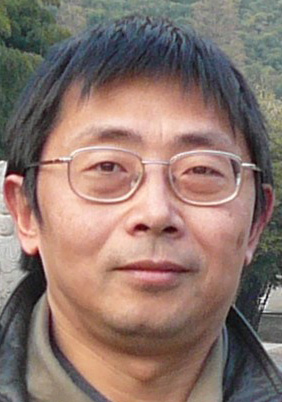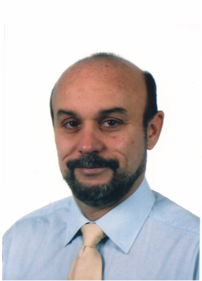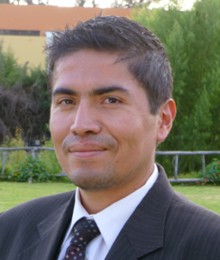KEYNOTE SPEAKERS
David Larrabeiti, Ph.D.  Dept. Telematics Engineering, Universidad Carlos III de Madrid (Spain)
Dept. Telematics Engineering, Universidad Carlos III de Madrid (Spain)
Biography: David Larrabeiti López has held the University Chair in Telematics Engineering at Universidad Carlos III de Madrid since 2006. He specialises in Communications Networks Switching systems and Architecture . Professor Larrabeiti graduated in Telecommunications Engineering in 1991 from the UPM, which also awarded his Doctorate in the same discipline in 1996. From 1991 to 1998 we worked as a researcher at the UPM developing validation tools and formal verification of communications protocols, the design and management of multinational research networks and implementation of next generation IP protocol stacks. He joined the Universidad Carlos III de Madrid as a tenured professor in October 1998, following which he worked on projects in the seventh framework programme for programmable and optic networks as chief researcher in three European excellence networks. He was also Technical Director of REDIMadrid, the academic and research network of the Community of Madrid and he collaborated in ANEP as assistant coordinator in the Communications Department as well as running the Telematic Engineering Department for four years. He is currently working on developing high speed traffic analysis systems.
Keynote Speech K1: 5G backhaul: A Challenging Scenario for Time-Sensitive Switching
Abstract: A number of new requirements from stringent communication scenarios requiring high bitrates close to link capacity, low latency or synchronous operation has recently triggered initiatives to enhance switching and transmission capabilities of packet switches once more. This is the case of the IEEE802.1 Time Sensitive Networking (TSN) Task Group, whose focus is time-synchronized low latency streaming services through 802 networks. More recently (October 2015), a new IETF working group has been formed in the Routing Area named “Deterministic Networking” (detnet), which shows the interest in designing layer 3 systems interworking with TSN-capable layer-2 switches. This interest is not just due to streaming: the number of scenarios where Ethernet or IP-MPLS routers could be applied as a cost-effective technology to replace circuits keeps growing as carriers demand more complex transport capabilities. This work reviews standards and challenges behind the design of a cost-effective access and metro switching technology capable of integrating front-haul and back-haul traffic for 5G, a problem being addressed by the XHAUL European research project.
 |
Jinsong Wu, Ph.D.  Past Research Scientist, Bell Labs, Alcatel-Lucent (Shangai, China)
Dept. Electrical Engineering, Universidad de Chile (Chile)
Past Research Scientist, Bell Labs, Alcatel-Lucent (Shangai, China)
Dept. Electrical Engineering, Universidad de Chile (Chile)
Biography: Ph.D. in Wireless Communications by Queen's University, Canada (2002 – 2006). Research fellow at University of Waterloo, Canada (2009 – 2010). He worked as a research scientist at Bell Laboratories, Alcatel-Lucent since 2010 until 2015 (Shanghai, China). He is now, as an Associate Professor, with the Department of Electrical Engineering, at Universidad de Chile (University of Chile). He was the leading Editor and a co-author of the comprehensive book, entitled “Green Communications: Theoretical Fundamentals, Algorithms, and Applications”, published by CRC Press in September 2012. He currently is an IEEE Senior Member.
Jinsong Wu is the founder and current Chair of the Technical Committee on Green Communications and Computing (TCGCC) of the IEEE ComSoc, which was established in 2011 as an official Technical Subcommittee (TSCGCC) and elevated as TCGCC in 2013. He is also the co-founder and Vice-Chair of the Technical SubCommittee on Big Data (TSCBD) in IEEE ComSoc. He is the founder and Series Editor on Green Communication and Computing Networks of the IEEE Communications Magazine. He is an Editor of the IEEE J. Select. Areas on Communications (JSAC) Series on Green Communications and Networking, Editor of IEEE Communications Surveys and Tutorials, Associate Editor of IEEE Systems Journal, Associate Editor of IEEE Access, Editor of KSII Transactions on Internet and Information Systems. He has served as the leading Guest Editor of Special Issue on Green Communications, Computing, and Systems in IEEE Systems Journal, Associate Editor of Special Section on Big Data for Green Communications and Computing in IEEE Access, Guest Editor of Special Issue on Green Communications in Elsevier Computer Networks, the leading Guest Editor of Feature Topics Issue on Context-Aware Networking and Communications in IEEE Communications Magazine, Guest Editor of Special Issue on Smart Backhauling and Fronthauling for 5G Networks in IEEE Wireless Communications, Guest Editor of Special Issue on Mobile Clouds in IEEE Transactions on Cloud Computing. He was Symposium Co-Chair and Track Vice-Chair on Green Communication Systems and Networks of the Selected Areas in Communications Symposium, IEEE GLOBECOM 2012. He was the leading General Chair in 2013 IEEE International Conference on Green Computing and Communications. He was Technical Program Committee Chair of IEEE Online Conference on Green Communications in both 2012 and 2013. He was Track Co-Chair on Green Communications and Networks, IEEE Vehicular Technology Conference 2014 Fall. He was the proposers and Chairs of the Technical Panels on Green Communications and Computing in the IEEE INFOCOM 2012, ICC 2012, and Globecom 2012.
Keynote Speech K4: The Relevance of Green Revolution to Information and Communication Technologies as well as Big Data
Abstract: Although the term of green has been often used to refer to energy consumption reduction or energy efficiency by many people and literatures, green actually should refer to environmental sustainability in more general senses. Environmental sustainability issues have been important topics for recent years, which has impacted and will further impacted individuals, enterprises, governments, and societies. Environmental sustainability is not simply regarding reducing the amount of waste or using less energy, but relevant to developing processes leading to completely sustainable human society in the future. The long term consequences of this serious issue have not yet been fully forecasted, but it has been generally accepted in many communities that immediate responses are necessary. The term of information and communications technologies (ICT) indicates the integration and convergence of two rapid growing fields, computing and communications. ICT are a big umbrella covering many topics and issues relevant to the modern times. Big data is a broad term for such large or complex ata sets that traditional data processing applications are inadequate. Big data are not just about the realization of information explosion, but about technologies that ensure value can be generated from the massive of data. This talk would discuss and explore the relevance of the modern green revolutions to ICT as well as big data issues. This talk also would talk about the features, benefits, challenges, and limitations of green revolution. The discussions would address the environmental sustainability issues, approaches, practices, and challenges for ICT as well as big data, and stress the interdisciplinary natures of relevant topics.
 |
Nelson Luis Saldanha da Fonseca, Ph.D.  Institute of Computing, State University of Campinas (Brazil)
Institute of Computing, State University of Campinas (Brazil)
Biography: Nelson Fonseca obtained his Ph.D degree from the University of Southern California in 1994. He is a Full Professor at the Institute of Computing, State University of Campinas, Brazil. He supervised 50+ graduate Thesis and published 300+ refereed papers on different topics such and multimedia service, traffic management and resource allocation in clouds and virtualized networks. He received the ComSoc Joseph Lo Cicero Award for Exemplary Services to Publications, the Medal of the Chancelor of the University of Pisa, the State University of Campinas Zeferino Vaz award for academic productivity in Computer Science and the Elsevier Computer Network Journal Editor of Year 2001 award. His graduate students received several awards in Latin America Thesis contests. Currently, he is the ComSoc Director for Conference Development and he served as ComSoc Vice President Member Relations, Director of Latin America Region and Director of On-line Services. He is past EiC of the IEEE Communications Surveys and Tutorials and a Senior Editor for the IEEE Communications Magazine. He is on the editorial board of Elsevier Computer Network Journal, Peer-to-Peer Network and Applications, Journal of Internet Services and Applications and Journal of the Brazilian Computer Society. He founded the conferences IEEE LATINCOM, IEEE LATINCLOUD and the series of Multimedia Communications Symposium in IEEE ICC and IEEE Globecom. He also chaired over 10 IEEE conferences.
Keynote Speech K3: Networking in the Big Data Era
Abstract: The volume of data being produced today is increasing to astronomical levels; such huge volumes of data are currently known as Big Data. Indeed, the recent introduction of smartphones and tablets, together with the widespread use of social networks, has even turned individuals into active sources of data production. Facebook receives approximately 30 billion uploads every month, implying a daily generation of 10 terabytes (TB) of data, while Twitter generates more than 7 TB of data every single day. Equally important is the information generated by the use of 5 billion mobile phones worldwide. These realms of data must also be processed to transform them into useful information and discover hidden inter-data relationships. Today, we are on the verge of a new era, and advancement will depend crucially on our capacity for effective and efficient communication of such enormous quantities of data. In consonance, in this talk, I will discuss the major challenges for networking technology in the provisioning of communication in the emerging era of Big Data.
 |
Guillermo Rafael-Valdivia, Ph.D.  Dept. Electronics & Telecommunications Eng., Universidad Católica San Pablo (Peru)
Dept. Electronics & Telecommunications Eng., Universidad Católica San Pablo (Peru)
Biography: He was born in Arequipa, Peru in 1974. Between 1991 and 1996 he studied Electronics Engineering at Universidad Nacional de San Agustín. Between 1997 and 2000 he served as a proffessor at Universidad Católica de Santa María. In 2000, he was awarded a scholarship (through the Spanish Agency for International Cooperation, AECI) for master and doctoral studies at Universidad de Cantabria, Spain. In 2004 he obtained the Ph.D. degree in Telecommunications and after that, a postdoctoral fellowship at the Department of Electronics Engineering at University College Dublin, Ireland. In April 2007 he joined Freescale Semiconductor (formerly, Motorola) as a design engineer in the RF group of Radio Frequency, in Toulouse (France), where he worked until December 2009. In that year he received the rank of Senior Member IEEE. After his return to Peru, he joined Universidad Católica San Pablo as a full professor, where he worked as the Head of the professional program of Telecommunications Engineering, and the Head of the Research Group of Radio Frequency. He was later hired as a full-time professor in TECSUP Arequipa, with the the career of Networks and Data Communication. He currently serves as a professor at UCSP, UCSM, and ULaSalle.
He has participated in several research projects, in Europe and Latin America, and has published more than 30 papers in prestigious refereed conferences and indexed journals. He has also served as TPC member of several conferences and has leaded undergraduate final career research projects. His research interests are the radiofrequency communications, amplifiers and microwave communications technologies.
Keynote Speech K2: New techniques for the design and implementation of high power microwave amplifiers for Wimax applications
Abstract: In high power applications at microwave frequencies, accuracy of measurements and CAD tools are critical in order to reach respectable performances. By using an RFIC LDMOS device we demonstrated that we can reach power and efficiency requirements for 3.5GHz Wimax applications. One of the critical aspects is the design of the nonlinear model for this kind of device. Several load pull measurements performed on an implemented demoboard will be shown as evidence of the performance of the device. In this work we will show results by using a 10MHz Wimax signal, biasing the device for class AB. For final stage applications and at +37dBm average output power from 3.4 to 3.6 GHz, we can reach an efficiency around 15 percent with an associated error vector magnitude at -33 dB. The gain can reach 25 dB across the band. Another feature of this design is that by simply optimizing the bias point, and slightly fine tunnning the PCB and using the same WiMAX signal as before, we can show that for +27 dBm output power, the ACP values are better than -52 dBc, while the EVM values are better than -36 dB. This feature makes this design suitable and flexible enough for these two configurations: driver and power stage.